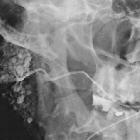follicular bronchiolitis


Follicular bronchiolitis (FB) is a nonneoplastic primary polyclonal B cell hyperplasia of the bronchus-associated lymphoid tissue (BALT) due to chronic exposure to antigens in those with underlying collagen vascular or immune deficiency diseases which usually manifested as small centrilobular ground glass nodules with lower lobe distribution.
Pathology
It is defined as lymphoid hyperplasia of the BALT and histologically characterized by polyclonal B cell hyperplasia of the lymphoid follicles with reactive germinal centers principally distributed along bronchioles with only minimal infiltration of alveolar septae.
Associations
Many cases of follicular bronchiolitis are associated with various systemic illnesses which include
- collagen vascular diseases / connective tissue diseases
- immunodeficiency states both congenital and acquired:
- idiopathic
Radiographic features
HRCT chest
A key feature described with follicular bronchiolitis on HRCT includes small ground glass centrilobular nodules of 3 mm diameter in lower lobes that are variably associated with peribronchial nodules .
Other features (albeit non-specific) include:
- tree in bud changes
- parenchymal cysts
Treatment and prognosis
Treatment should target the underlying condition as well as administration of steroid and immunosuppressants. The overall prognosis will depend on the underlying or associated abnormality. Some case may respond to macrolide antibiotics .
Differential diagnosis
- hypersensitivity pneumonitis: history of environmental/organic antigen exposure
- respiratory bronchiolitis: history of smoking
- infection
Siehe auch:
- Rheumatoide Arthritis
- Milchglasverschattungen
- Bronchiolitis
- Sjögren-Syndrom
- tree in bud-Muster
- zentrilobuläre Lungennoduli
- lymphoproliferative Lungenerkrankungen
und weiter:

 Assoziationen und Differentialdiagnosen zu follikuläre Bronchiolitis:
Assoziationen und Differentialdiagnosen zu follikuläre Bronchiolitis:





